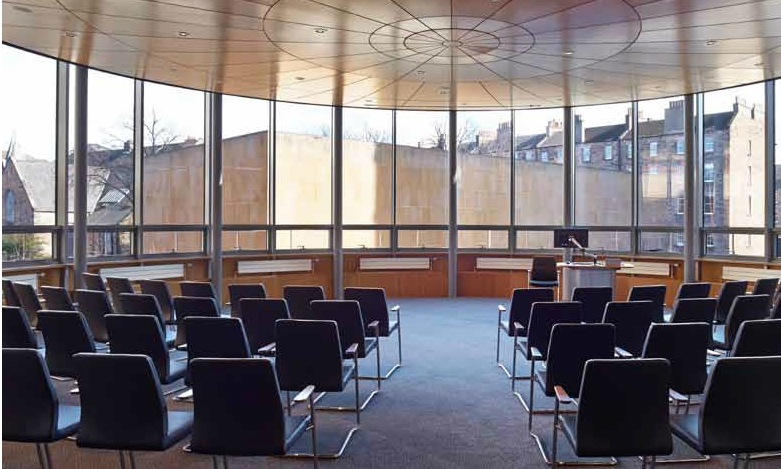Brexit for the HE sector: The Big Conversation
Association of University Directors of Estates’ (AUDE) Chair Trevor Humphreys, Director of Estates and Facilities at the University of Surrey, discusses AUDE’s recent Big Conversation event and the challenges and opportunities facing the HE sector in 2017.
In January we hosted our annual AUDE Big Conversation series. The event provided members the opportunity to discuss, debate and exchange views on the hottest topics in higher education.
Over 70 delegates attended the event held at the London School of Economics. The attendees included a mix of AUDE members, suppliers and industry experts from the sector. Delegates were welcomed by host Simon Fanshawe, co-founder and partner of Diversity by Design. The day kicked off with Professor Sir Ian Diamond, Principal and Vice-Chancellor of the University of Aberdeen, exploring the key events in higher education over the decades and hypothesising about the future of HE beyond Brexit and the HE White Paper. Sir Ian discussed on the current challenges facing the higher education sector and how estates can respond through innovation and providing world class facilities.
The key focus for the Big Conversation, explored the challenges and opportunities of Brexit. Brexit is set to affect the sector considerably, but its impact is yet to be determined. Undoubtedly, our student demographic, our workforce, our costs, as well as research funding will all be impacted. According to the European University Association, the UK has the largest number of participants in the EU’s research programme and is currently the biggest destination for European students heading to study abroad.
Across the sector we are seeing a downward trend in applications from EU students to study in the UK. This is worrying as the continued expansion of UKHE and investment in the estate is somewhat dependent on fee income generated from these students. It would appear that Brexit is already having an impact, but the ability to continue to access European funding for research is a key concern for the higher education sector and for politicians.
Additionally, the expansion of UK universities and investment in campuses is largely dependent on continued access to these students, so with Brexit on the horizon it will be interesting to see how this affects international links. It may be prudent for universities to focus on the appropriate structure to maintain their credentials as European universities in the lead up to this change.
A large proportion of academic and support staff originate from the EU and their ability to remain in the UK post Brexit remains uncertain. Changes in how EU citizens can choose to live and work in the UK will have a significant impact across HEI’s, where there are many staff working in estates and facilities and working for contractors too. A skills shortage in the construction industry is already well known and many of the existing workforce are EU migrants. To cut this supply off or to severely restrict the supply could have damaging effect on contractor’s ability to deliver projects together with upward pressure on tender prices.
However, with challenges comes new opportunities. Peter Aitchison, director of communications and public affairs at the University of Glasgow, advised directors of estates to keep calm, manage risks and look for wins, commenting that the higher education industry is a vital driver of the economy. Andrew Burgess, deputy chief operating officer at Loughborough University, asked us to consider the influence higher education institutions and estates have over the situation we now find ourselves in, highlighting the need to utilise our network and consider how we move forward whilst avoiding complacency.
Universities now must look beyond Brexit for new markets as it’ll be crucial to ensure the learning and teaching environments are fit for purpose, that staff are flexible and have strong values, that courses focus on co-curricular and employability, that students are given choice, that research will be impactful and interface more with industry and that University’s maintain the confidence of their communities. The Government White Paper encourages competition so it’s more important than ever that we create an enticing environment for all EU students to live, learn and grow.
AUDE recently published some excellent examples of how estates directors are leading the way on this agenda and we are seeing some great examples of universities working more closely with business and communities to drive local and regional economic growth. However, we would do well to look at the very challenging HE funding environment in Scotland and Wales where cuts have been faster and deeper. Estate directors have had to work incredibly hard to work within extremely challenging recurrent and capital budgets. In England we may well be facing similar challenges in 2017 and beyond and we must work harder at exploring solutions that colleagues have developed at their respective institutions.
Undoubtedly the future remains challenging and there is a need for universities to continue to control costs and drive efficiency in their operations. Universities continue to be more business-focused, working with their local and regional partners to secure both their economic future and that of the wider region.
2017 will be an interesting year in defining the future of higher education; AUDE will continue to support and promote excellence within the sector.
For further information, please visit www.aude.ac.uk


